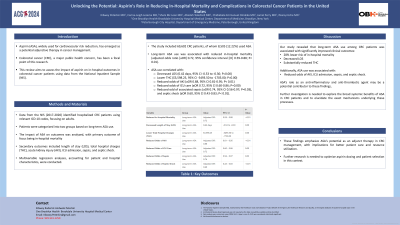Tuesday Poster Session
Category: Colon
P3645 - Unlocking the Potential: Aspirin's Role in Reducing In-Hospital Mortality and Complications in Colorectal Cancer Patients in the United States
Tuesday, October 29, 2024
10:30 AM - 4:00 PM ET
Location: Exhibit Hall E

Has Audio
.jpg)
Kibwey Peterkin, MD
One Brooklyn Health-Brookdale University Hospital Medical Center
Brooklyn, NY
Presenting Author(s)
Kibwey Peterkin, MD1, Carina-Leigh Lezama, MD2, Shani Mc Lean, MD1, Abiolah Telesford, MD1, Jamal Perry, MD1, Chidiebele Emmanuel Omaliko, MD1, Ifeanyi Uche, MD1
1One Brooklyn Health-Brookdale University Hospital Medical Center, Brooklyn, NY; 2Peterborough City Hospital, Peterborough, England, United Kingdom
Introduction: Aspirin (ASA), widely used for cardiovascular risk reduction, has emerged as a potential adjunctive therapy in cancer prevention and treatment. Colorectal cancer (CRC), a major public health concern, has been a focal point of this research. This review aims to assess the impact of aspirin on in-hospital outcomes in colorectal cancer patients using data from the National Inpatient Sample (NIS).
Methods: Data from the NIS (2017-2020) identified hospitalized CRC patients using relevant ICD-10 codes, focusing on adults. Patients were categorized based on long-term ASA use. The impact of ASA on outcomes was analyzed, with primary focus on in-hospital mortality, and secondary outcomes including length of stay (LOS), total hospital charges (THC), acute kidney injury (AKI), ICU admission, sepsis, and septic shock. Multivariable regression analyses, accounting for patient and hospital characteristics, were conducted.
Results: The study included 69,602 CRC patients, of whom 8,505 (12.22%) used ASA. ASA users tended to be older, male, White, and Medicare insured. Long-term ASA use was associated with reduced in-hospital mortality (adjusted odds ratio [aOR] 0.72, 95% confidence interval [CI] 0.59-0.88; P< 0.01). ASA use correlated with decreased LOS (0.42 days, 95% CI -0.53 to -0.30; P=0.00), lower THC ($3,598.25, 95% CI -5493.50 to -1703.00; P=0.00), reduced odds of AKI (aOR 0.88, 95% CI 0.81-0.95; P< 0.01), ICU care (aOR 0.72, 95% CI 0.60-0.86; P=0.00), sepsis (aOR 0.74, 95% CI 0.56-0.97; P=0.03), and septic shock (aOR 0.60, 95% CI 0.43-0.83; P< 0.01).
Discussion: Aspirin use demonstrated significant benefits in improving in-hospital outcomes for CRC patients. These include reduced mortality, shorter hospital stays, lower costs, and decreased risks of complications. These findings emphasize aspirin's potential as an adjunct therapy in CRC management, with implications for better patient care and resource utilization. Further research is needed to optimize aspirin dosing and patient selection in this context.
Disclosures:
Kibwey Peterkin, MD1, Carina-Leigh Lezama, MD2, Shani Mc Lean, MD1, Abiolah Telesford, MD1, Jamal Perry, MD1, Chidiebele Emmanuel Omaliko, MD1, Ifeanyi Uche, MD1. P3645 - Unlocking the Potential: Aspirin's Role in Reducing In-Hospital Mortality and Complications in Colorectal Cancer Patients in the United States, ACG 2024 Annual Scientific Meeting Abstracts. Philadelphia, PA: American College of Gastroenterology.
1One Brooklyn Health-Brookdale University Hospital Medical Center, Brooklyn, NY; 2Peterborough City Hospital, Peterborough, England, United Kingdom
Introduction: Aspirin (ASA), widely used for cardiovascular risk reduction, has emerged as a potential adjunctive therapy in cancer prevention and treatment. Colorectal cancer (CRC), a major public health concern, has been a focal point of this research. This review aims to assess the impact of aspirin on in-hospital outcomes in colorectal cancer patients using data from the National Inpatient Sample (NIS).
Methods: Data from the NIS (2017-2020) identified hospitalized CRC patients using relevant ICD-10 codes, focusing on adults. Patients were categorized based on long-term ASA use. The impact of ASA on outcomes was analyzed, with primary focus on in-hospital mortality, and secondary outcomes including length of stay (LOS), total hospital charges (THC), acute kidney injury (AKI), ICU admission, sepsis, and septic shock. Multivariable regression analyses, accounting for patient and hospital characteristics, were conducted.
Results: The study included 69,602 CRC patients, of whom 8,505 (12.22%) used ASA. ASA users tended to be older, male, White, and Medicare insured. Long-term ASA use was associated with reduced in-hospital mortality (adjusted odds ratio [aOR] 0.72, 95% confidence interval [CI] 0.59-0.88; P< 0.01). ASA use correlated with decreased LOS (0.42 days, 95% CI -0.53 to -0.30; P=0.00), lower THC ($3,598.25, 95% CI -5493.50 to -1703.00; P=0.00), reduced odds of AKI (aOR 0.88, 95% CI 0.81-0.95; P< 0.01), ICU care (aOR 0.72, 95% CI 0.60-0.86; P=0.00), sepsis (aOR 0.74, 95% CI 0.56-0.97; P=0.03), and septic shock (aOR 0.60, 95% CI 0.43-0.83; P< 0.01).
Discussion: Aspirin use demonstrated significant benefits in improving in-hospital outcomes for CRC patients. These include reduced mortality, shorter hospital stays, lower costs, and decreased risks of complications. These findings emphasize aspirin's potential as an adjunct therapy in CRC management, with implications for better patient care and resource utilization. Further research is needed to optimize aspirin dosing and patient selection in this context.
Disclosures:
Kibwey Peterkin indicated no relevant financial relationships.
Carina-Leigh Lezama indicated no relevant financial relationships.
Shani Mc Lean indicated no relevant financial relationships.
Abiolah Telesford indicated no relevant financial relationships.
Jamal Perry indicated no relevant financial relationships.
Chidiebele Emmanuel Omaliko indicated no relevant financial relationships.
Ifeanyi Uche indicated no relevant financial relationships.
Kibwey Peterkin, MD1, Carina-Leigh Lezama, MD2, Shani Mc Lean, MD1, Abiolah Telesford, MD1, Jamal Perry, MD1, Chidiebele Emmanuel Omaliko, MD1, Ifeanyi Uche, MD1. P3645 - Unlocking the Potential: Aspirin's Role in Reducing In-Hospital Mortality and Complications in Colorectal Cancer Patients in the United States, ACG 2024 Annual Scientific Meeting Abstracts. Philadelphia, PA: American College of Gastroenterology.

